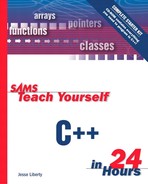Summary
In this hour you learned more details about working with the preprocessor. Each time you run the compiler, the preprocessor runs first and translates your preprocessor directives such as #define and #ifdef.
The preprocessor does text substitution, although, with the use of macros, these can be somewhat complex. By using #ifdef, #else, and #ifndef, you can accomplish conditional compilation, compiling in some statements under one set of conditions and in another set of statements under other conditions. This can assist in writing programs for more than one platform, and is often used to conditionally include debugging information.
Macro functions provide complex text substitution based on arguments passed at compile time to the macro. It is important to put parentheses around every argument in the macro to ensure that the correct substitution takes place.
Macro functions, and the preprocessor in general, are less important in C++ than they were in C. C++ provides a number of language features, such as const variables and templates, that offer superior alternatives to using the preprocessor.
